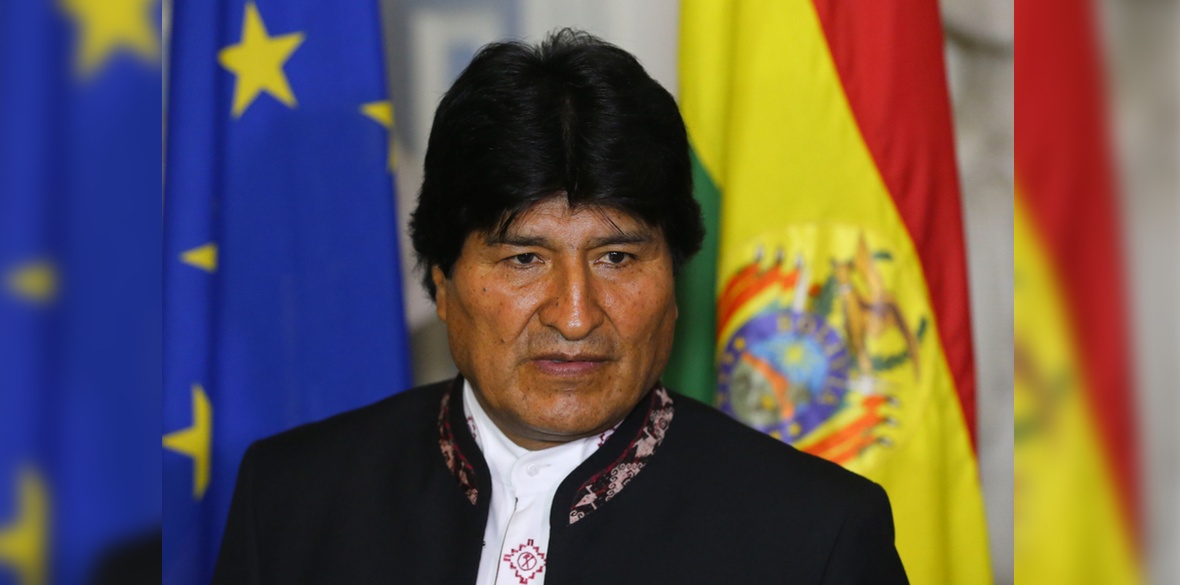This is the last article you can read this month
You can read more article this month
You can read more articles this month
Sorry your limit is up for this month
Reset on:
Please help support the Morning Star by subscribing here
THIS is general election year in Bolivia, with voting for Bolivia’s Chamber of Deputies, Senate and president taking place. Nine candidates are seeking to become president.
One recent opinion poll (late February) gave current president Evo Morales a 35.6 per cent vote share, a 5.1 per cent lead over main opposition candidate and former president Carlos Mesa, who was trailing behind at 30.5 per cent.
Another poll in March suggested 64 per cent of Bolivians are happy with the mandate of Morales and 45 per cent intended to vote for him in October.
Since first winning the presidency in the 2005 election, Morales has shown that a better world is possible for Latin Americans through a clear rejection of neoliberal policies.
Instead, the economic model championed by Morales is based on what is called “social community production,” supported by a strong participation of the state in strategic sectors.
Rather than privatise public assets and impose austerity, Morales has retaken control of key parts of the country’s economy from foreign corporations.
Through its nationalisation policies, not only of gas and oil, but telecommunications, water, electricity and a number of mines, Bolivia has massively increased its state revenues.
These resources have been invested in a range of state programmes to modernise the country’s infrastructure and raise the standard of living for Bolivia’s poor and neglected people.
As a result, Bolivia has had record economic growth levels that have made it the fastest-growing economy in the region.
Despite falls in the prices of key exports, Bolivia closed 2018 with one of the highest economic growth rates in Latin America, at 4.7 per cent of gross domestic product (GDP), according to official data.
Over 13 years the economy has more than tripled in size. In the same period the Central Bank of Bolivia (BCB) has indicated that Bolivia’s public external debt fell from 52 per cent to 24 per cent of national GDP. Annual inflation is a mere 1.5 per cent.
This economic success has been coupled with greater social inclusion and a 50 per cent reduction in poverty.
Morales’s latest healthcare measures illustrate developments in social inclusion. Having tripled the healthcare budget since 2006, on March 1 this year he launched Bolivia’s new and free Unified Health System (SUS).
This aims to expand health coverage to the 70 per cent of the population who lack any form of insurance.
Some $200 million will be allocated in 2019 to guarantee the SUS’s sustainability by improving its equipment, supplies and infrastructure and increasing the number of qualified healthcare professionals.
The new healthcare arrangements dovetail with the government’s objective to build children’s and mothers’ hospitals across the country, to improve maternal and child healthcare and reduce infant mortality.
At the SUS inauguration, Fernando Leanes, Pan American Health Organisation (PAHO) and the World Health Organisation (WHO) representative, described Bolivia’s health-related policies as “extraordinary,” citing the reductions in infant mortality and child malnutrition, increased healthy life expectancy and the number of professionally attended births and diseases under control.
Internationally, Morales’s championing of the rights of indigenous people was recently recognised as the host at the launching of the International Year of Indigenous Languages in New York for the United Nations.
Through Bolivia’s leadership role, a swathe of policies to preserve indigenous rights around the world have been approved in both the Organisation of American States and the United Nations.
Additionally, Bolivia under Morales has become known as one of the most progressive and active governments in the world on climate change.
To give just one example, since 2006 renewable power generation almost tripled, from 750MW to 2,100MW.
In a defence of national sovereignty and international law, Bolivia has also stood by Venezuela against the threats of war from the Trump administration.
On a visit to Caracas on his way back from the New York launch, Morales tweeted “our full support against the interventionist coup of the empire that seeks to take over the Venezuelan riches, violating international law,” adding that “Bolivia supports dialogue to avoid confrontations.”
With all this in mind, perhaps it is not surprising that there is growing concern that the Trump administration will increase intervention in Bolivia in a bid to stop Morales continuing as president.
Internationally we must speak up in solidarity with social progress in Bolivia and against US intervention.
Colin Burgon is honorary president of Labour Friends of Progressive Latin America.
You can sign a statement in solidarity with Bolivia at bit.ly/boliviastatement.
Join Colin Burgon, Dan Carden MP, former Telesur English journalist Georgia Platman, Bolivian speaker Manuel Bueno and more special guests at a meeting on April 30 at 6.30pm at Unite, 128 Theobalds Road, London WC1X 8TN on Bolivia, Evo Morales and the Transformation of a Nation. Tickets and more info at bit.ly/april30bolivia.










